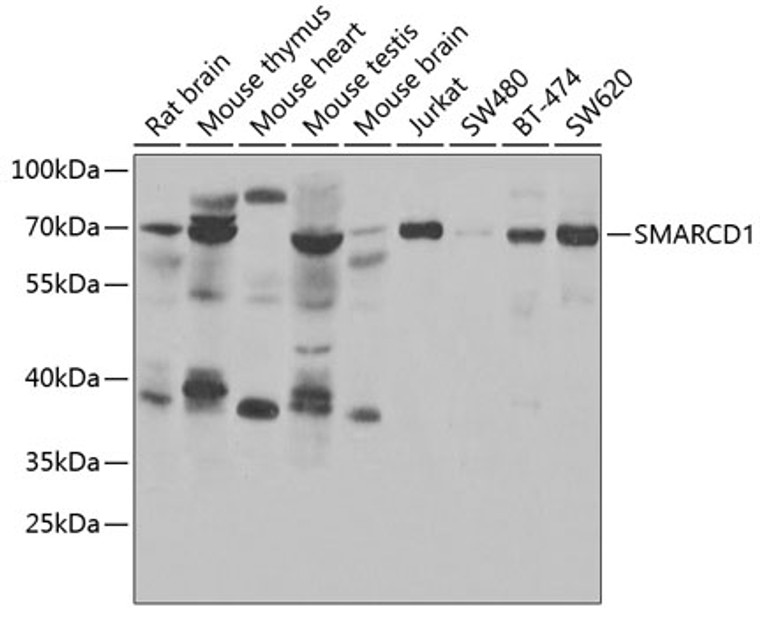| Host: |
Rabbit |
| Applications: |
WB |
| Reactivity: |
Human/Mouse/Rat |
| Note: |
STRICTLY FOR FURTHER SCIENTIFIC RESEARCH USE ONLY (RUO). MUST NOT TO BE USED IN DIAGNOSTIC OR THERAPEUTIC APPLICATIONS. |
| Short Description: |
Rabbit polyclonal antibody anti-SMARCD1 (216-515) is suitable for use in Western Blot research applications. |
| Clonality: |
Polyclonal |
| Conjugation: |
Unconjugated |
| Isotype: |
IgG |
| Formulation: |
PBS with 0.02% Sodium Azide, 50% Glycerol, pH7.3. |
| Purification: |
Affinity purification |
| Dilution Range: |
WB 1:500-1:2000 |
| Storage Instruction: |
Store at-20°C for up to 1 year from the date of receipt, and avoid repeat freeze-thaw cycles. |
| Gene Symbol: |
SMARCD1 |
| Gene ID: |
6602 |
| Uniprot ID: |
SMRD1_HUMAN |
| Immunogen Region: |
216-515 |
| Immunogen: |
Recombinant fusion protein containing a sequence corresponding to amino acids 216-515 of human SMARCD1 (NP_003067.3). |
| Immunogen Sequence: |
LEDSALSKYDATKQKRKFSS FFKSLVIELDKDLYGPDNHL VEWHRTATTQETDGFQVKRP GDVNVRCTVLLMLDYQPPQF KLDPRLARLLGIHTQTRPVI IQALWQYIKTHKLQDPHERE FVICDKYLQQIFESQRMKFS EIPQRLHALLMPPEPIIINH VISVDPNDQKKTACYDIDVE VDDTLKTQMNSFLLSTASQQ EIATLDNKIHETIETINQLK TQREFMLSFARDPQGFIND |
| Tissue Specificity | Expressed in all tissues tested, including brain, heart, kidney, liver, lung, muscle, pancreas and placenta. |
| Function | Involved in transcriptional activation and repression of select genes by chromatin remodeling (alteration of DNA-nucleosome topology). Component of SWI/SNF chromatin remodeling complexes that carry out key enzymatic activities, changing chromatin structure by altering DNA-histone contacts within a nucleosome in an ATP-dependent manner. Belongs to the neural progenitors-specific chromatin remodeling complex (npBAF complex) and the neuron-specific chromatin remodeling complex (nBAF complex). During neural development a switch from a stem/progenitor to a postmitotic chromatin remodeling mechanism occurs as neurons exit the cell cycle and become committed to their adult state. The transition from proliferating neural stem/progenitor cells to postmitotic neurons requires a switch in subunit composition of the npBAF and nBAF complexes. As neural progenitors exit mitosis and differentiate into neurons, npBAF complexes which contain ACTL6A/BAF53A and PHF10/BAF45A, are exchanged for homologous alternative ACTL6B/BAF53B and DPF1/BAF45B or DPF3/BAF45C subunits in neuron-specific complexes (nBAF). The npBAF complex is essential for the self-renewal/proliferative capacity of the multipotent neural stem cells. The nBAF complex along with CREST plays a role regulating the activity of genes essential for dendrite growth. Has a strong influence on vitamin D-mediated transcriptional activity from an enhancer vitamin D receptor element (VDRE). May be a link between mammalian SWI-SNF-like chromatin remodeling complexes and the vitamin D receptor (VDR) heterodimer. Mediates critical interactions between nuclear receptors and the BRG1/SMARCA4 chromatin-remodeling complex for transactivation. Interacts with AKIRIN2. |
| Protein Name | Swi/Snf-Related Matrix-Associated Actin-Dependent Regulator Of Chromatin Subfamily D Member 160 Kda Brg-1/Brm-Associated Factor Subunit ABrg1-Associated Factor 60aBaf60aSwi/Snf Complex 60 Kda Subunit |
| Database Links | Reactome: R-HSA-3214858Reactome: R-HSA-8939243 |
| Cellular Localisation | Nucleus |
| Alternative Antibody Names | Anti-Swi/Snf-Related Matrix-Associated Actin-Dependent Regulator Of Chromatin Subfamily D Member 1 antibodyAnti-60 Kda Brg-1/Brm-Associated Factor Subunit A antibodyAnti-Brg1-Associated Factor 60a antibodyAnti-Baf60a antibodyAnti-Swi/Snf Complex 60 Kda Subunit antibodyAnti-SMARCD1 antibodyAnti-BAF60A antibody |
Information sourced from Uniprot.org
12 months for antibodies. 6 months for ELISA Kits. Please see website T&Cs for further guidance







